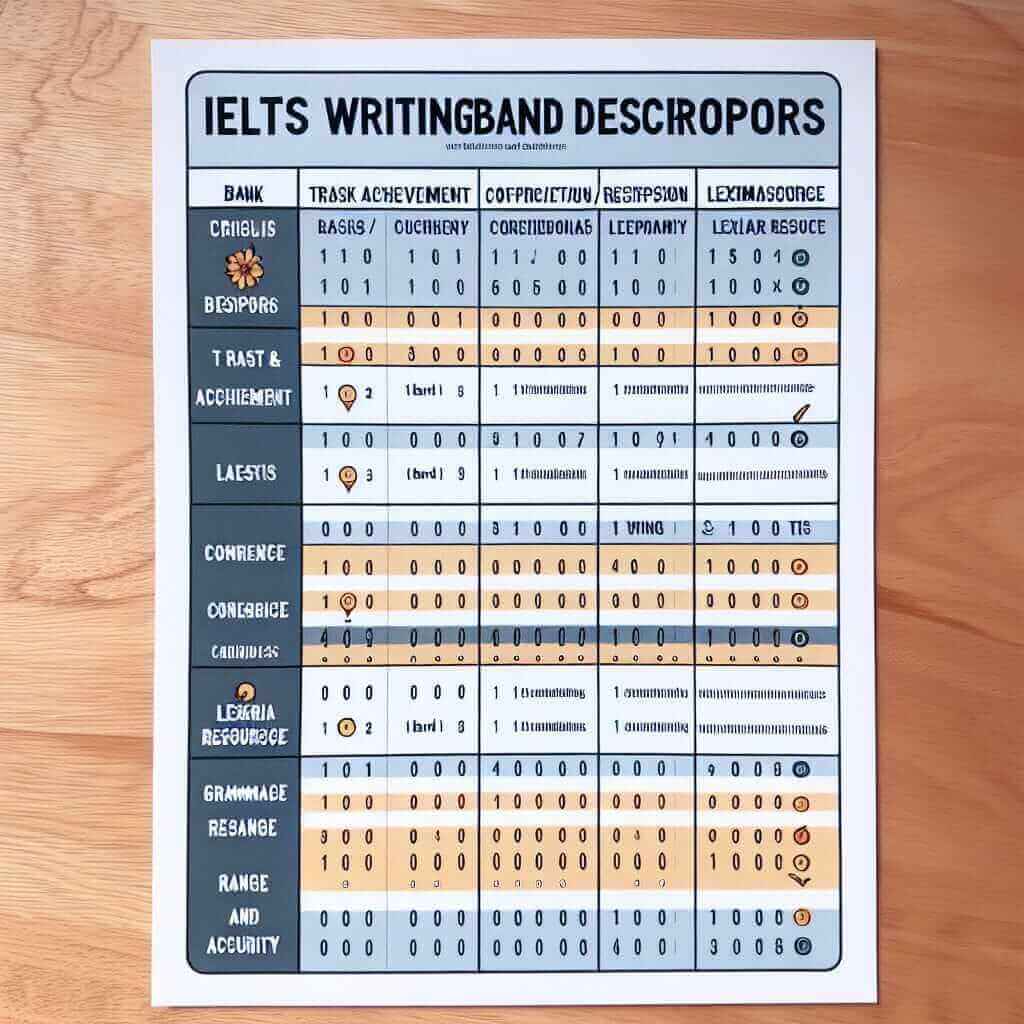The IELTS Academic Writing band descriptor is a vital tool for anyone aiming to ace the writing section of the IELTS exam. It outlines the specific criteria used to assess your writing skills and assigns a band score accordingly. Understanding these descriptors is crucial for identifying your strengths and weaknesses, setting realistic goals, and ultimately achieving your desired band score.
Deciphering the IELTS Academic Writing Band Descriptors
The IELTS Academic Writing test consists of two tasks, each assessed using four key criteria:
1. Task Achievement/Response: This criterion assesses how effectively you have addressed the task requirements. For Task 1, it involves accurately summarizing and highlighting key features of visual data. For Task 2, it involves presenting a well-developed response to the prompt, with clear arguments and supporting evidence.
Example:
For Task 1, a band 9 response “fully satisfies all the requirements of the task,” while a band 6 response “addresses the requirements of the task,” but may “overgeneralize at times.”
2. Coherence and Cohesion: This criterion focuses on the overall organization and flow of your writing. It considers how effectively you connect ideas using cohesive devices like linking words and pronouns, as well as paragraphing and logical sequencing.
Example:
A band 8 writer uses “cohesive devices appropriately and effectively,” while a band 6 writer uses them “with some flexibility and accuracy.”
3. Lexical Resource: This criterion evaluates the range and accuracy of your vocabulary. It considers your ability to use a variety of words and phrases appropriately, demonstrate awareness of collocations, and avoid errors in word choice.
Example:
A band 9 writer uses a “wide range of vocabulary with very natural and sophisticated control of lexical features,” while a band 6 writer uses an “adequate range of vocabulary,” but with “occasional errors in word choice.”
4. Grammatical Range and Accuracy: This criterion assesses your mastery of English grammar. It considers your ability to use a variety of grammatical structures accurately and appropriately, including complex sentences and punctuation.
Example:
A band 9 writer uses a “wide range of grammatical structures consistently accurately,” while a band 6 writer uses a “mix of simple and complex sentence forms,” but with “some grammatical errors.”
Putting it into Practice: Sample IELTS Writing Task 2 Question
Question:
“Some people believe that the best way to reduce crime is to impose stricter punishments on criminals. Others argue that other measures are more effective. Discuss both views and give your own opinion.”
Band 8 Sample Response:
The issue of crime and how best to address it has been a subject of intense debate for decades. While some advocate for harsher punishments as a deterrent, others believe that focusing on rehabilitation and societal factors is more effective. This essay will delve into both perspectives before presenting a balanced viewpoint.
Those in favor of stricter penalties argue that severe consequences deter potential offenders. The logic is straightforward: if individuals know they face lengthy prison sentences or hefty fines, they are less likely to engage in criminal activity. For instance, countries with stringent drug laws often boast lower drug use rates. However, this approach fails to address the root causes of crime, such as poverty, lack of education, and social inequality.
Conversely, proponents of alternative measures emphasize the importance of rehabilitation. They argue that simply punishing criminals does not address the underlying issues that led them to offend in the first place. Instead, investing in education and job training programs can equip ex-offenders with the skills and opportunities to reintegrate into society successfully. Moreover, addressing societal problems like poverty and discrimination can create an environment where crime is less likely to flourish.
In conclusion, while the threat of punishment can deter some individuals, a truly effective approach to reducing crime necessitates a multi-pronged strategy. This involves not only enforcing the law but also investing in social programs that address the root causes of criminal behavior. By creating a society that offers opportunities for all, we can foster an environment where crime is less likely to occur in the first place.

Common Mistakes and How to Avoid Them
1. Ignoring Task Requirements: Carefully analyze the question prompt to fully understand what is being asked.
2. Lack of Cohesion: Use appropriate linking words and phrases to connect ideas within and between paragraphs.
3. Limited Vocabulary: Expand your vocabulary by reading extensively and using a dictionary and thesaurus.
4. Grammatical Errors: Proofread your writing carefully to identify and correct grammatical errors.
Strategies for Improvement
1. Familiarize yourself with the band descriptors: Regularly review the official IELTS band descriptors to understand the specific criteria used for assessment.
2. Practice writing tasks regularly: Set aside dedicated time for writing practice, focusing on different task types and topics.
3. Seek feedback from experienced teachers or tutors: Get your writing assessed by qualified professionals to receive personalized feedback and guidance.
4. Analyze model answers: Study high-scoring sample answers to understand how to effectively structure your writing, use vocabulary, and demonstrate grammatical accuracy.
Conclusion: Your Path to Writing Success
Mastering the IELTS Academic Writing band descriptors is an ongoing process that requires dedicated effort and a strategic approach. By understanding the assessment criteria, practicing regularly, and seeking feedback, you can steadily improve your writing skills and achieve your desired band score. Remember, consistent effort and a positive attitude are key to unlocking your full writing potential.